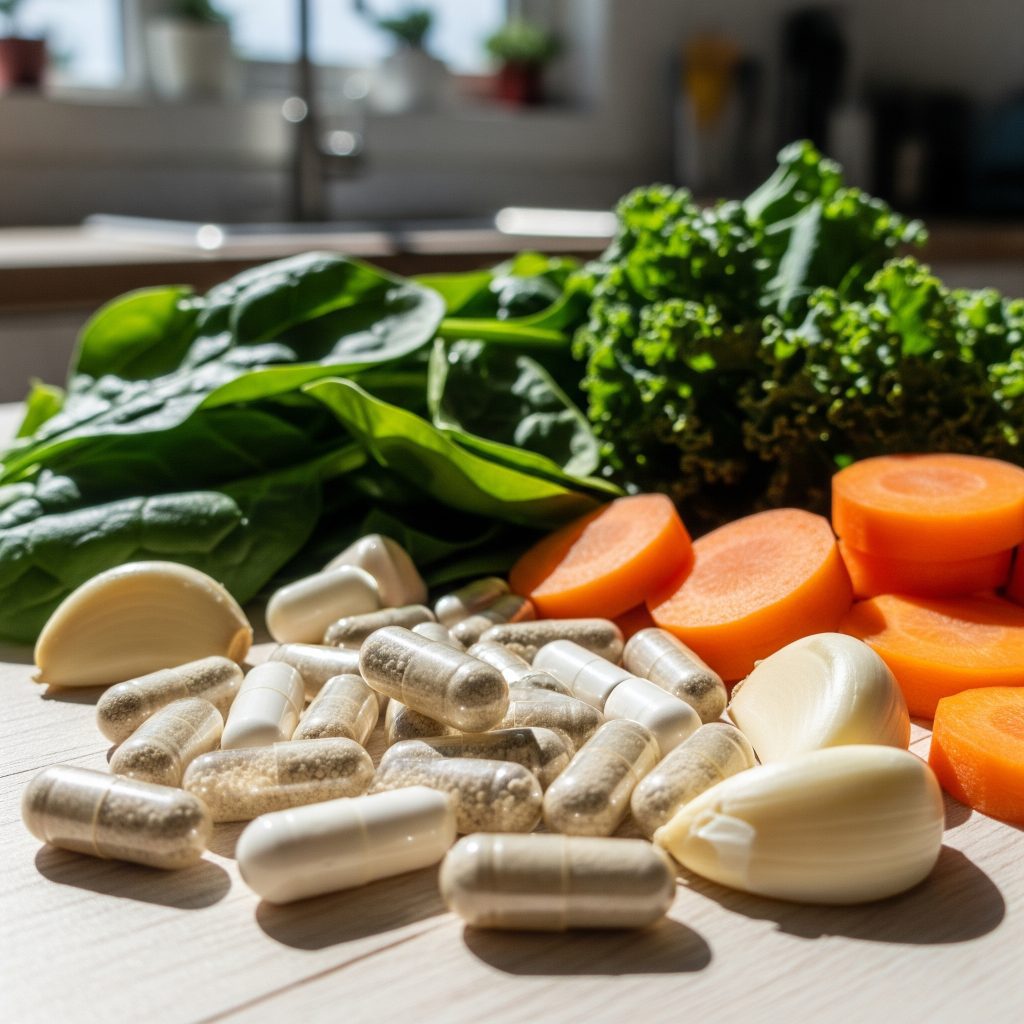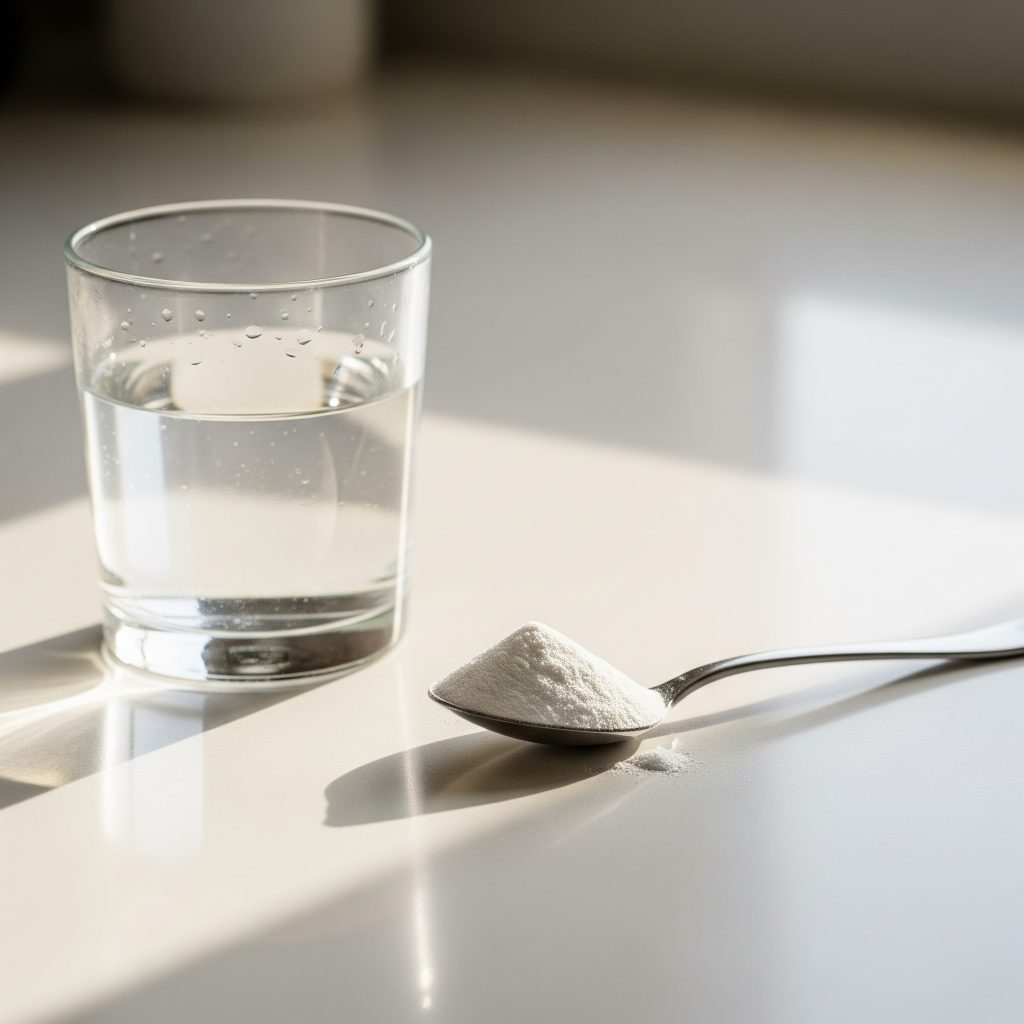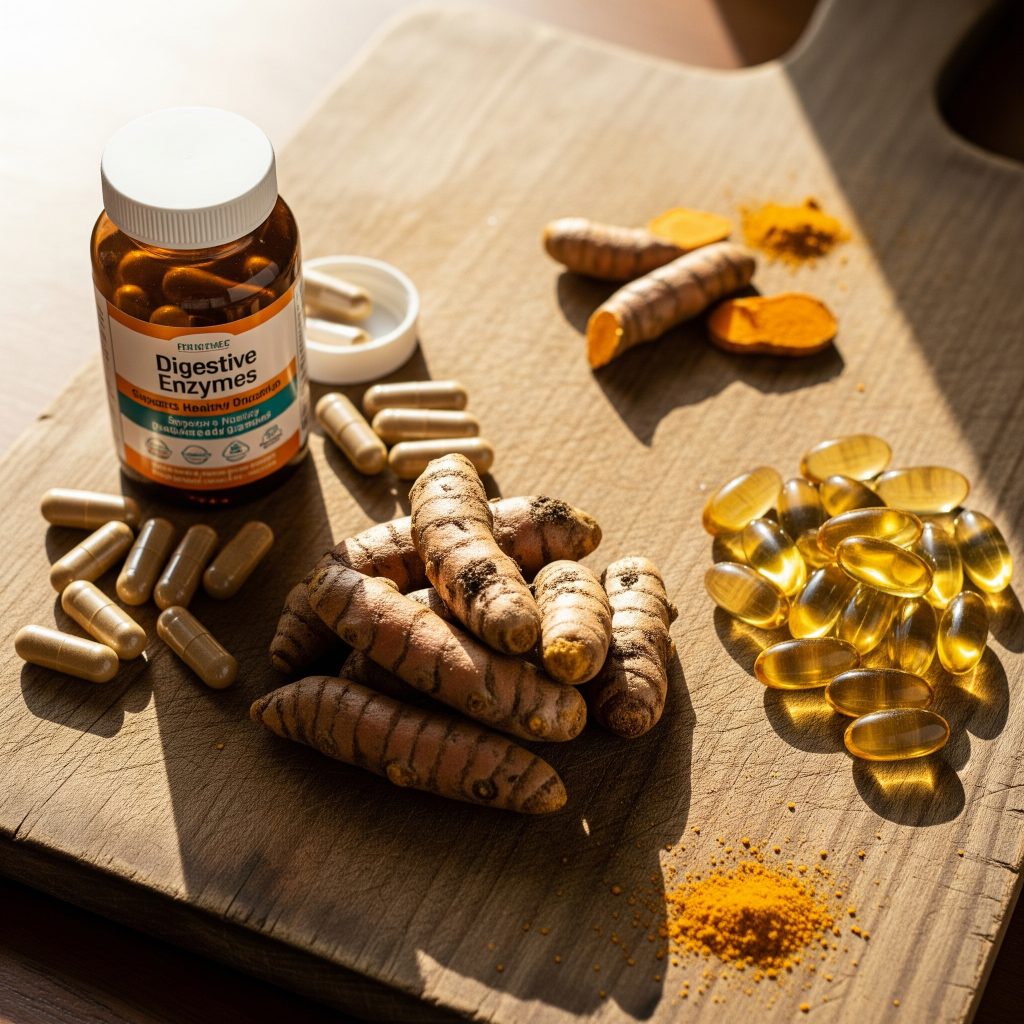estoring your gut requires more than a single supplement. The most effective approach combines targeted probiotics, gut-healing nutrients, anti-inflammatory compounds, and digestive support into a structured digestive health stack. This article explains a clinically backed leaky gut protocol in four phases, showing you how to implement each step while minimizing side effects and maximizing results.
Summary / Quick Answer
A complete gut health protocol focuses on restoring microbiome balance, repairing the intestinal barrier, and supporting digestion in a structured way:
- Probiotics – Multi-strain blends taken 30 minutes before meals
- Prebiotics – Inulin, FOS, and GOS with meals, separate from probiotics
- L-glutamine – 10-30g/day on an empty stomach for barrier repair
- Digestive enzymes – With the first bite of food
- Anti-inflammatory support – Curcumin and omega-3s with fat-containing meals
- Timeline – 12–16 weeks for initial results, 6–12 months for lasting change
This phased plan reduces die-off reactions and supports long-term gut function.
Understanding Gut Health and Why It Breaks Down
Gut health depends on a balanced microbiome, an intact intestinal barrier, and efficient digestion. When these systems are disrupted, conditions like bloating, food sensitivities, and IBS often develop. Chronic stress, poor diet, antibiotics, and inflammatory foods can all damage the gut lining, leading to “leaky gut” – increased intestinal permeability that allows unwanted particles into the bloodstream.

Research shows that restoring gut health requires addressing multiple pathways at once:
- Rebalancing beneficial bacteria
- Repairing the intestinal lining
- Reducing inflammation
- Supporting digestive enzyme activity
These strategies form the foundation of any effective digestive health stack.
Choosing the Right Probiotics
Not all probiotics are equal. Clinical data shows multi-strain blends outperform single strains for long-term microbiome balance. Effective digestive protocols include 3–8 strains targeting different gut functions.
Condition-specific strains include:
- Bifidobacterium longum 35624 – Shown to reduce IBS symptoms at just 100 million CFU/day
- Lactobacillus plantarum – Supports gut barrier proteins like ZO-1 and occludin
- VSL#3 – A high-dose formula (300–450 billion CFU three times daily) for severe gut issues
For the best survival, take probiotics 30 minutes before meals or with low-fat meals. Food buffers stomach acid, improving bacterial survival. To compare leading brands and strains, see our Best Probiotics Comparison.
Prebiotic Fiber – Feeding Your Good Bacteria
Prebiotics are fermentable fibers that feed beneficial bacteria. Only three compounds meet the strict scientific definition:
- Inulin (5–15g/day) – Increases Bifidobacterium levels and produces butyrate for barrier repair
- Fructooligosaccharides (FOS) (2–10g/day) – Targets beneficial species while limiting pathogen growth
- Galactooligosaccharides (GOS) (5–15g/day) – Improves calcium absorption and supports gut lining health
Start low (2–5g/day) to avoid bloating, and separate prebiotics from probiotics by 10–15 minutes. For a deeper explanation of how these work together, read Prebiotics vs. Probiotics.
L-Glutamine – Fuel for Gut Barrier Repair
L-glutamine is the preferred fuel for intestinal cells, helping repair damage from leaky gut. Clinical studies show doses of 0.5g per kg body weight can significantly reduce permeability and inflammation within weeks.

Protocol:
- Dose: 10–30g/day, divided into 2–3 servings
- Timing: On an empty stomach for best absorption
- Duration: Notable results in 8–10 days, full repair in 4–8 weeks
For common mistakes to avoid when using this amino acid, see L-Glutamine Benefits.
Digestive Enzyme Support
If your digestion is sluggish or incomplete, supplemental enzymes can help. Take them just before or with the first bite of food so they are present during the breakdown process.
Types to include:
- Proteases – Protein digestion, reducing inflammatory peptides
- Lipases – Fat digestion and fat-soluble vitamin absorption
- Amylases – Carbohydrate breakdown to reduce bloating
Plant-based enzymes work across a wider pH range than animal-derived ones. For full guidance, see our Digestive Enzymes Guide.
Anti-Inflammatory Compounds for Gut Lining
Chronic gut inflammation delays healing. Two well-studied supplements can help:
- Curcumin (500–1000mg/day) – Supports gut barrier integrity and reduces symptoms; take with fat for absorption
- Omega-3 fatty acids (1–2g/day) – EPA and DHA maintain intestinal membrane health and reduce systemic inflammation
Both should be taken with meals for better uptake and tolerance.
The Four-Phase Gut Health Protocol
A gradual, structured approach reduces side effects and allows your microbiome to adapt.
Phase 1 – Foundation (Weeks 1–2)
- Start low-dose probiotics and L-glutamine
- Introduce digestive enzymes
- Begin omega-3 supplementation
Phase 2 – Build (Weeks 3–6)
- Increase L-glutamine to full dose
- Add multi-strain probiotics
- Introduce prebiotics slowly
Phase 3 – Optimize (Weeks 7–12)
- Add curcumin and advanced anti-inflammatory compounds
- Adjust dosages based on tolerance and results
Phase 4 – Maintain (Week 13 onward)
- Rotate probiotic strains
- Maintain a diverse, plant-rich diet
- Continue core supplements at maintenance doses
Managing Die-Off Reactions
When probiotics kill harmful bacteria, toxins may be released, causing headaches, fatigue, or digestive upset. This “die-off” usually resolves within 1–3 weeks.

Strategies:
- Start with low doses and increase gradually
- Stay hydrated
- Use binding agents like activated charcoal (under guidance)
- Support detox pathways with magnesium and B vitamins
Long-Term Gut Health Strategies
Lasting gut health improvements typically require 6–12 months. Key factors include:
- Consistent supplementation
- Eating 20–30 different plant foods weekly
- Managing stress, sleep, and exercise
- Periodic testing and adjustments with a qualified practitioner
For more on how gut health affects mood and cognition, visit our Gut-Brain Connection.
Conclusion
An effective digestive health stack targets multiple pathways: microbiome diversity, barrier repair, inflammation control, and digestion. By following a phased leaky gut protocol with clinically proven supplements, you can restore gut function and maintain it for the long term. Your results will depend on consistency, lifestyle habits, and the right supplement choices for your needs.

